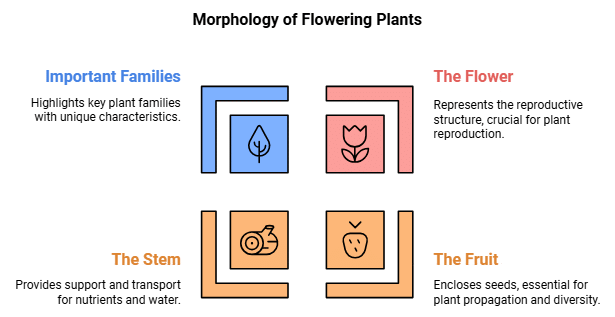9 days Study Plan: Morphology of Flowering Plants | Biology Class 11 - NEET PDF Download

Botany Chapter “Morphology of Flowering Plants” contains 7% weightage in NEET Exam (2000-2023). The high-priority topics of the chapter ‘Morphology of Flowering Plants’ from which there is a greater chance of occurrence in the NEET Exam are listed below:
1. The Flower
2. The Fruit
3. The Stem
4. Description of some important families
The following chart shows the topic-wise weightage of "Morphology of Flowering Plants" in the NEET exam:

Since this chapter constitute 7% of NEET Biology section, this chapter becomes crucial for the exam. Below given is the detailed study plan for fool-proof preparation of this chapter:
Day 1: Learn about Root and its modifications in detail
- Video: Primary & Fibrous Root Types
- Doc: The Root: Types, Regions of Root & Modification of Root
- Video: Root Regions
- Video: Root Parts
Day 2: Learn about Stem and its modifications in depth
- Video: Tendril & Thorns: Aerial Stem
- Video: Sub-Aerial Stem
- Test: Roots, Stems and Leaves- 1
- Test: Roots, Stems and Leaves- 2
Day 3: Leaves, its types and Inflorescence in detail
- Doc: Venation & Modification of Leaves
- Doc: The Leaf: Its Types, Phyllotaxy, Venation & Modification
- Video: Types of Leaves: Simple, Compound
- Video: Lamina Shapes: Veins, Venation
- Doc: The Inflorescence
Day 4: Flower
- Doc: Morphology of Flowering Plants
- Video: The Parts of a Flower
- Video: Structure of Flower
- Video: Type of Flower- 1
- Video: Type of Flower- 2
- Doc: The Flower: Parts & Functions
- Video: Types of Aestivation
- Video: Stamen: Structure & Arrangement
- Video: Carpel: Structure
- Video: Types of Placentation
- Doc: Angiosperms, Difference between Angiosperms & Gymnosperms
Day 5: Learn about Fruit
- Video: Structure of Fruit
- Doc: The Fruit: Parts, Structure, Uses & Classification
- Video: Simple Fleshy, Dry & Aggregate: Morphology of Flowering Plants
- Video: Edible parts of fruits
- Test: The Flower, Fruit & Seed
Day 6: Seed and Semi-technical description of a typical flowering plant
- Video: Seed: Structure & Types
- Doc: Seed: Development, Types & Germination
- Video: Dicot & Monocot Seed
- Doc: Semitechnical Description of a flowering Plant & Description of Important Families
Day 7: Description of Some Important Families
- Doc: Family Description: Solanaceae, Fabaceae & Liliaceae
- Test: Floral Formula & Important Families of Flowering Plants
- Test: Families of Angiosperm
Day 8: Revise the complete chapter and attempt tests
- Doc: Key notes: Morphology of Flowering Plants
- Doc: Mind Map: Morphology of Flowering Plants
- Doc: Important Notes for NEET: Morphology in Flowering Plants
- Test: Morphology of Flowering Plants- 1
- Test: Plant Morphology
- Test: Morphology of Flowering Plants- 2
- Test: Morphology of Flowering Plants- Assertion & Reason Type Questions
Day 9: Previous Year Paper
|
180 videos|367 docs|148 tests
|
FAQs on 9 days Study Plan: Morphology of Flowering Plants - Biology Class 11 - NEET
| 1. What are the main parts of a flower and their functions? |  |
| 2. How does pollination occur in flowering plants? |  |
| 3. What is the difference between complete and incomplete flowers? |  |
| 4. What role do petals play in attracting pollinators? |  |
| 5. What are the types of inflorescences in flowering plants? |  |























